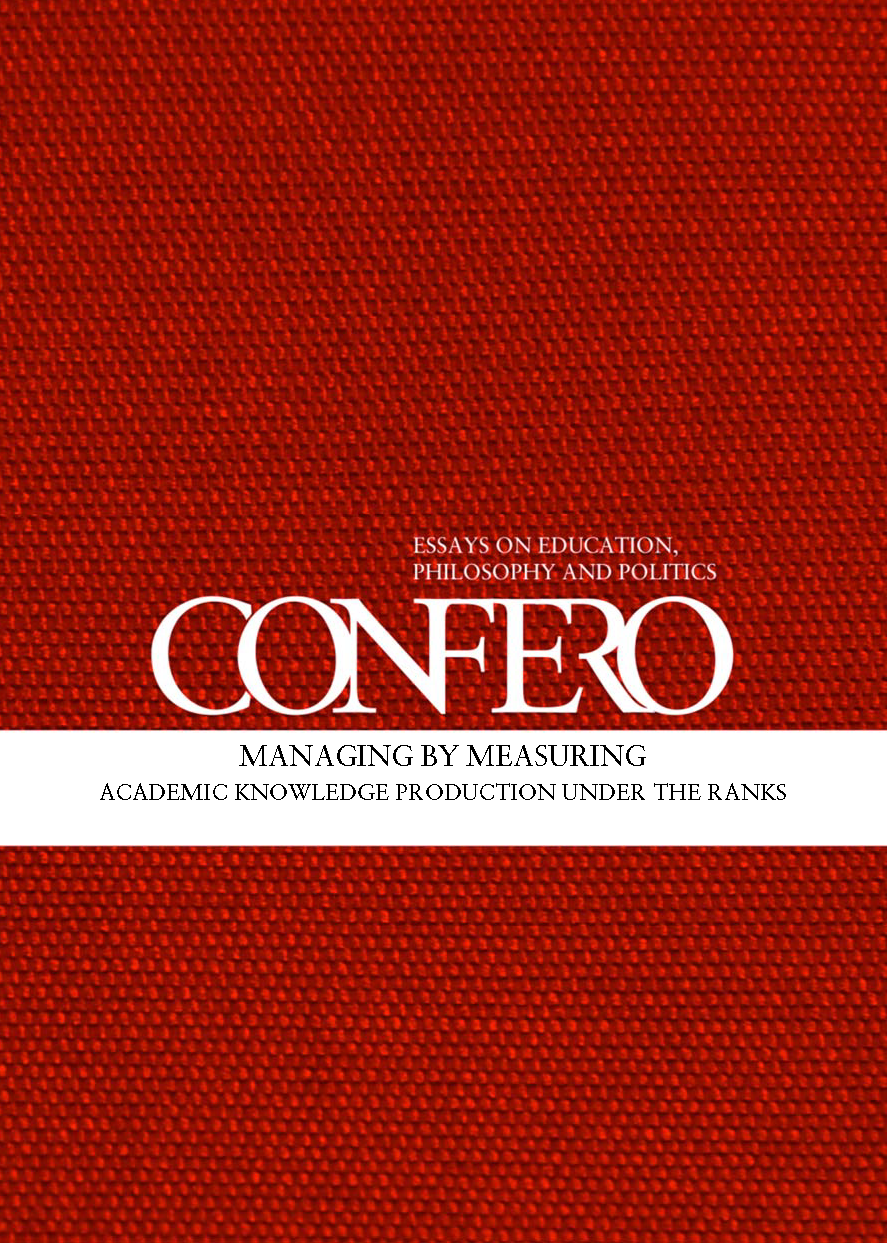Geopolitics of sensing and knowing
On (de)coloniality, border thinking, and epistemic disobedience
DOI:
https://doi.org/10.3384/confero.2001-4562.13v1i1129Abstract
Decoloniality is, in the first place, a concept whose point of origination was the Third World. Better yet, it emerged at the very moment in which the three world division was collapsing and the celebration of the end of history and a new world order was emerging. The nature of its impact was similar to the impact produced by the introduction of the concept of “biopolitics”, whose point of origination was Europe. Like its European counterpart, “coloniality” moved to the center of international debates in the non-European world as well as in “former Eastern Europe.” While “biopolitics” moved to center stage in “former Western Europe” (cf., the European Union) and the United States, as well as among some intellectual minorities of the non-European followers of ideas that originated in Europe, but who adapt them to local circumstances, “coloniality” offers a needed sense of comfort to mainly people of color in developing countries, migrants and, in general, to a vast quantitative majority whose life experiences, long and short-term memories, languages and categories of thoughts are alienated to life experience, long and short-term memories, languages and categories of thought that brought about the concept of “biopolitics” to account for mechanisms of control and state regulations.
References
al-Jabri, Mohammed. Introduction a la Critique de la Raison Arabe. Paris, Edition La Découverte, 1995.
Chatterjee, Partha. A Possible India: Essays in Political Criticism. Delhi, Oxford University Press, 1997.
de Oto, Alejandro and Quintana, Marta María. "Biopolítica y colonialidad." Tabula Rasa, Vol. 12, 2010,pp. 47–72.
Fanon, Frantz. Les Damnés de la Terre. Paris, Éditions Maspero, 1961.
Fanon, Frantz. Black Skin, White Masks. New York, Grove Press, 1967.
Flores Pinto, Jaime. "Sociologia del Ayllu", 2009. http://rcci.net/globalizacion/2009/fg919.htm [Retrieved 15 February 2013].
Gordon, Lewis R. Existentia Africana: Understanding Africana Existential Thought. New York, Routledge, 2000.
Hui, Wang. The Rise of Modern Chinese Thought. Beijing, SDXJoint PublishingCompany, 1991.
Les Indigènes de la République. ¨The Decolonizing Struggle in France. An Interview with Houria Bouteldja.” Monthly Review. 2 Nov 2009, http://www.indigenes-republique.fr/article.php3?id_article=763 [Retrieved 15 February 2013].
Maldonado-Torres, Nelson. "The Coloniality of being." Cul-tural Studies, Vol. 21, no. 2, 2007, pp. 240–270. doi: 10.1080/09502380601162548
Meeks, Brian and Norman Girvan (eds.). The Thought of the New World: The Quest for Decolonization. Kingston, Ian Randle Publishing, 2010.
Mignolo, Walter. The Darker Side of the Renaissance. Literacy, Territoriality and Colonization. Ann Arbor, The University of Michigan Press, 1995
Mignolo, Walter. "Epistemic disobedience, independent thought and decolonial freedom." Theory, Culture and Society. Vol. 26, no. 7–8, 2009, pp. 159–181. doi: 10.1177/0263276409349275
Mignolo, Walter. "The Communal and the Decolonial", 2010a. http://turbulence.org.uk/turbulence-5/decolonial/ [Retrieved 15 February 2013].
Mignolo, Walter. Desobediencia Epistémica. Retórica de la Modernidad, Lógica de la Colonialidad y Gramática de la Descolonialidad. Buenos Aires, Ediciones del Signo, 2010b.
Popes For Slavery. "Popes For Slavery." http://www.romancatholicism.org/popes-slavery.htm [Retrieved 15 February 2013].
Trouillot, Michel-Rolph. "North Atlantic universals: Analytical fictions, 1492–1945." South Atlantic Quarterly, Vol. 101, no. 4, 2002, pp. 839-858. doi: 10.1215/00382876-101-4-839
Yongle, Zhang. ”The Future of the Past. On Wang Hui’s Rise of Modern Chinese Thought.” New Left Review, Vol. 62, 2010, p. 47-83.
Downloads
Published
Issue
Section
License
Copyright (c) 2013 Walter Mignolo

This work is licensed under a Creative Commons Attribution 4.0 International License.
As Confero is an open access journal, this means that anyone who can access the Internet can freely download and read the journal. There are no commercial interests for Linköping University Electronic Press or Confero in publishing the journal.
The core idea of open access is that copyright remains with the author(s). However, we publish with the agreement of the author that if she or he decides later to publish the article elsewhere, that the publisher will be notified, prior to any acceptance, that the article has already been published by Confero.
When publishing with Confero, it is with the agreement of the author that if they make their article available elsewhere on the internet (for example, on their own website or an institutional website), that they will do so by making a link to the article as published in Confero using the Digital Object Identifier (DOI) number of the article and acknowledge in the text of the site that the article has been previously published in Confero.
As evident by the markers on our homepage, Confero falls under the Creative Commons licence abbreviated BY. This means that we allow others to use, spread and elaborate on the published articles, as long as they acknowledge who published it and where it was originally published.



